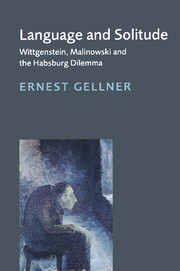Book contents
- Frontmatter
- Contents
- Preface
- Foreword
- Part I The Habsburg dilemma
- Part II Wittgenstein
- Part III Malinowski
- Part IV Influences
- 32 The impact and diffusion of Wittgenstein's ideas
- 33 The first wave of Wittgenstein's influence
- 34 A belated convergence of philosophy and anthropology
- Part V Conclusions
- General bibliography
- Bibliographies of Ernest Gellner's writings on Wittgenstein, Malinowski, and nationalism
- Index
34 - A belated convergence of philosophy and anthropology
Published online by Cambridge University Press: 05 March 2010
- Frontmatter
- Contents
- Preface
- Foreword
- Part I The Habsburg dilemma
- Part II Wittgenstein
- Part III Malinowski
- Part IV Influences
- 32 The impact and diffusion of Wittgenstein's ideas
- 33 The first wave of Wittgenstein's influence
- 34 A belated convergence of philosophy and anthropology
- Part V Conclusions
- General bibliography
- Bibliographies of Ernest Gellner's writings on Wittgenstein, Malinowski, and nationalism
- Index
Summary
By about the 1980s there was a curious and partial convergence of the two traditions that have concerned this book. The philosophical line which sprang from Wittgenstein and his absolutisation of culture under the name ‘form of life’ flowed together with the tradition springing from that other and more overtly loyal subject of Franz Josef. Wittgenstein, you might say, had in his own life re-lived human history, in reverse. He had first worked out the only possible epistemology and ontology of the solitary individual living within a cultureless Gesellschaft, and had then switched to a closed community in which people only speak and think as a team. He reinvented the theory of Gemeinschaft in a linguistic idiom. His life went contrary to the main current of humanity … Malinowski, on other hand, always recognised the co-existence of the two styles of thought, and moved only mildly in the same direction as Wittgenstein, from treating the two styles as equal, to stressing the communalistic one as more fundamental (though not, it would seem, as exclusively sovereign).
At the time when the two traditions were both being formed in England, they interacted very little, despite the interesting overlap in personnel, notably in C. K. Ogden. But, in subsequent generations, the two currents were due to meet. By then, of course, neither tradition was pure. Late Wittgensteinianism had by now become vieux jeu in philosophy. Everyone knew the opening moves and counter-moves and it was not easy to claim superior insight and standing in virtue of this familiarity: it was too well diffused. So the style migrated to neighbouring fields such as literary studies, anthropology, and the humanities generally.
- Type
- Chapter
- Information
- Language and SolitudeWittgenstein, Malinowski and the Habsburg Dilemma, pp. 174 - 178Publisher: Cambridge University PressPrint publication year: 1998

